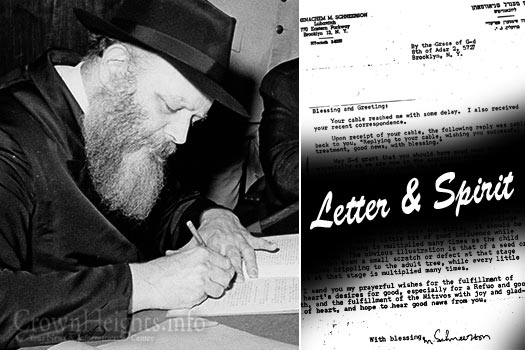
Letter & Spirit: How Much Is Knowledge Worth?
In this week’s edition of Letter & Spirit, we present a letter from the Rebbe in which he explains clearly the saying of our Sages: yesh chochmo ba’goyim taamin, yesh Torah ba’goyim al taamin – there is knowledge/science in the nations, believe; there is Torah in the nations, do not believe. The letter was written through the Rebbe’s trusted secretary Rabbi Nissan Mindel, and was made available by the latter’s son-in-law, Rabbi Sholom Ber Shapiro.
This weekly feature is made possible by a collaboration between CrownHeights.info and Nissan Mindel Publications. Once a week we publish a unique letter of the Rebbe that was written originally in the English language, as dictated by the Rebbe to Rabbi Mindel.
**********
By the Grace of G-d
3rd of Nissan, 5738
Brooklyn, N.Y.
Mr.
Summit, N.J. 07901
Greeting and Blessing:
This is to confirm receipt of your letter, enclosing your memorandum in response to the “Letter of Criteria” of the Principals’ Council.
It is difficult in a letter to discuss this most important and vital subject adequately. However, no lengthy exposition is necessary in your case, and I would like to make the following point briefly:
As you know, our Sages declare: yesh chochmo ba’goyim ta’amin; yesh Torah ba’goyim al ta’amin.
One of the explanations is that chochmo is knowledge (“science” in the original sense). It is therefore possible for a person to acquire knowledge without it necessarily having a decisive impact on his daily life and conduct. An obvious and most tragic example of this is what happened in Germany in our lifetime which, though it excelled in many areas of science, philosophy, ethics, etc., but in actual practice and conduct it sank to the abysmal depth of depravity and in fact, used its scientific and technological achievements to that end.
Torah, on the other hand, means “teaching” and instruction. And while it is also – hee chochmoschem u’vinaschem, namely, the highest kind of knowledge, the essential aspect of Torah is that it is Toras chayim, the true, Divinely-given, guide in the daily life.
The basis for the distinction is quite simple. Where knowledge has its roots in the human mind alone and serves the desires and ambitions of man, including all natural proclivities and drives, it is inevitable that all this would debase his knowledge and science. And when a person would be pressed to make a judgment about his conduct, and having no other “justification,” he will declare that his conduct is a personal matter, and he takes full responsibility for its consequences, etc., even declaring that what he is doing is good and justified, as in the case of the Germans.
But where knowledge is based on a Supra-human Source, namely G-d, the Creator of man and Supreme Authority, then that knowledge is of a different category, for together with it comes the Divinely-given strength to comply with the Will of G-d and to implement it in the daily life and conduct, regardless of the extent of the person’s understanding of the Will of G-d and he does it with the fullest measure of enthusiasm. Indeed, this compliance and conduct gives him new insights also into the understanding of the Divine precepts, etc.
The point of it, in practical terms, is that, as you also mention in your memorandum, the basic principle of Jewish education has always rested on the cornerstone of the principle of Naaseh v’Nishma. Certainly it should be more readily appreciated in our day and age, after whet we have seen of the results of the higher education in such academia as the Universities of Berlin, Bonn, Heidelberg, etc., which was reflected not merely in exceptional cases of so-called abnormal persons, but was embraced by scores of millions of people. Similarly, though fortunately not quite to the same extent, many things are going on in the campuses of colleges and universities in the U.S.A., and prior to that, in the public schools, which should make it obvious to everyone who wants to ensure a good human society in general, that knowledge and science per se can be worse than useless unless it is based on true belief in a Supreme Being, the Creator and Master of the world. For, of what value can all the knowledge of the students, boys and girls, be, if after taking their eyes off the textbook and looking into the environment and society around them, they see a schizophrenic picture.
To conclude on the subject of the present month of Nissan, the month of ge’ula, which, according to our Sages, the ge’ula from Mitzrayim and from all its abominations, came in the zechus of the children who were brought up to be able to declare, “This is my G-d” – may G-d grant that every Jewish child, regardless of his or her background, should receive a Torah-true education, based on Toras Emes, where truth cannot be compromised, since truth compromised is no truth at all; and based on the principle of the Torah that the essential thing is the deed, namely the actual observance of the mitzvos in the daily life and conduct throughout the day, not only in school, but also outside of it, as a total commitment.
Wishing you and yours a kosher and inspiring Pesach,
With blessing,
**********
The above letter is from a forthcoming volume of The Letter and the Spirit Series, two volumes of which have been published to date, with volume three coming out shortly, IYH. The letters are from the archives of Rabbi Dr. Nissan Mindel, a personal secretary to the Previous Rebbe and The Rebbe, whose responsibilities included the Rebbe’s correspondence in English.
We thank Rabbi Sholom Ber Shapiro, director of Nissan Mindel Publications and the one entrusted by Rabbi Mindel, his father-in-law, with his archives, for making these letters available to the wider public. May the merit of the many stand him in good stead.












